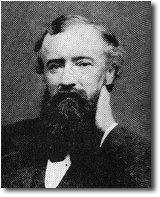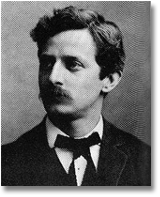Visitors’ Center Script: Whitman’s Disciples, part three
December 3rd, 2009

My first disciple is John Burroughs. Like Kevin explained about Maurice Bucke, Burroughs imagined himself a friend and disciple of Whitman before they had even met. Burroughs acts as a loyal friend and defender to Whitman two years prior to meeting him: “In 1862 he had frequently visited Pfaff’s beer cellar, a bohemian watering hole and the center of literary life in Manhattan. There Burroughs championed Whitman in literary arguments, anticipating at every moment a meeting with the poet himself” (Sarracino). This is a behavior Burroughs would continue to exhibit toward Whitman after they became friends and throughout their friendship.
In 1864 Burroughs and Whitman met, by chance, in Washington D.C. Whitman was heading toward the army hospital, so he invited the unemployed Burroughs along. Burroughs got a job nursing the wounded, but he didn’t have the stomach for it and quickly left. Even though Burroughs’s employment at the hospital didn’t last, his friendship with Whitman would last until the poet’s death—and beyond.
Burroughs held several odd jobs, none of which lasted long to the chagrin of his wife, Ursula, but he always wanted to write. Under Whitman’s tutelage and encouragement, Burroughs developed his writing skills, sending pieces to magazines while working at his day jobs. Eventually, with Whitman’s help, he discovered his niche in writing about nature; he had an amazing eye for the details of nature, which in turn inspired Whitman to sharpen his eye for his poetry. Once again, Whitman’s relationship with his friend/disciple involved giving and receiving advice: It was a true friendship, not a one-sided relationship.
Burroughs’s behavior also reveals a proto-feminist perspective in Whitman. When Burroughs and his wife were having marital problems, Whitman sided with Ursula, always. He chastised Burroughs for his infidelity and insisted Ursula’s lack of sexual interest in Burroughs was a result of his failings to earn her love. This is a very interesting defense of the wife of a friend. Naturally, Ursula was a good friend of Whitman, though not a disciple.
There is also a quasi-sexual element between Burroughs and Whitman. I’m not claiming that they were lovers, though it is a possibility that can never be proven, but I thought it was very interesting that Burroughs referred to the love of his life (not Ursula) as “Whitmanesque.” She could have been described as beautiful, or intelligent, or any other adjective, but Burroughs chooses to describe her in similar terms as his dead friend. Clearly, this is an indication of the love and devotion Burroughs felt for Whitman, which persisted after the poet’s death and remained until his own death.
Like Bucke, Burroughs also wrote a biography of Whitman, Notes on Walt Whitman, which was also edited and partially written by Whitman. It also isn’t very objective. In his introduction, Burroughs includes inflated language about how Whitman isn’t appreciated in his own time, but will one day be absorbed by America—in the way Whitman sought to be absorbed.
Click here for Notes on Walt Whitman

My next disciple is Horace Traubel who, unlike the previous disciples, was only fourteen when he met Whitman in Camden in 1873. Because of the vast age difference between Traubel and Whitman, there were whisperings and rumors of a sexual nature among the neighbors. Again, there is no evidence of anything sexual in their relationship, but there is a quasi-sexual element present between them.
Traubel viewed himself as Whitman’s son, and he played the role of a devoted son—even after Whitman’s death. He tended to Whitman as he was ailing, carefully writing a journal/book With Whitman in Camden. In his note to readers in With Whitman in Camden, Traubel explains his motivation for writing the book and how it is designed to honor Whitman’s wishes.
Click here for the first part of With Whitman in Camden
Traubel writes about how he will tell the truth about Whitman in his final months because that is how the poet wanted to be remembered.
Growing up, Traubel was increasingly interested in reform and read Leaves of Grass as having a socialist agenda. He received confirmation from a reluctant Whitman. In any event, Traubel’s work was to take what he felt Whitman started in Leaves of Grass and extend it to be even more radical with a major socialist slant. Traubel wrote his own books, but they can be read as “socialist refigurings of Whitman’s work” (Folson). His work as a radical reformist made it difficult for him to find and keep a good job. So, he lived a relatively impoverished life.
A few days before he died in 1919, Traubel saw a vision of Walt Whitman beckoning him to the afterlife. Again, this is an example of Whitman having the divine meaning of a demigod for his disciples. Traubel is buried in Harleigh Cemetery close by Whitman’s tomb—like a son would be buried nearby a father.
Works Cited
Folsom, Ed. “Disciples: Biography, Horace Traubel.” The Walt Whitman Archive, 2009. Web. 28 Nov. 2009.
Sarracino, Carmine. “Disciples: Biography, John Burroughs.” The Walt Whitman Archive, 2009. Web. 29 Nov. 2009.
Leave a Reply